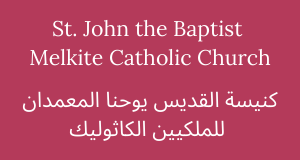The Melkites (or the Byzantine rite Catholics of Middle Eastern origin) are the descendants of the early Christians of Antioch (Syria). Christianity was established in this area of the Middle East by St. Peter before he traveled on to the imperial city of Rome.
The Melkite Church is an Antiochean Church in the Middle East which remained in communion with the Emperor of Constantinople and the Church there, even after the Arab invasions. “Melkite” comes from the Syriac “Malko” which means King, in reference to the Emperors who supported the Council of Chalcedon. The early Melkite tradition included Syriac speaking Christians and Syriac Liturgical usage.
The Melkite Church and the Roman Catholic Church are not the same church. There was great strain between the Melkite Church and Rome due to the Crusades. When the Western Catholics came into the Holy Land, they did not recognize the legitimacy of the Eastern methods of worship. By the end of the Crusades, there was an estrangement between the churches, but the Melkites never actually broke of relations with Rome.
Some of the Antiochean faithful looked to the West for salvation of their church, while others only saw the missionaries as outsiders who did not understand their eastern customs, ancestral laws, and had not gone through the centuries of deprivations. As a result in 1724, the church split in two. One faction under the influence of Constantinople became known at the Antiochean Orthodox, while the other group, loyal to Rome, became known at the Melkite Catholics.
Since the formal declaration of Roman/Melkite union in 1724, the Melkite Catholics have worked steady to be a “voice for the East within the Western Church.” Melkite Patriarch Gregory Joseph spent his thirty-three years working for union of the Churches while striving to maintain the Eastern traditions and rituals. His was a significant voice during the deliberations of the first Vatican Council and he was an important influence on Pope Leo XIII’s Orientalium Dignit.
Today the Melkite Patriarchal seat is in Damascus with residences in Raboueh (Lebanon) and Cairo. The Patriarch has the title of “Patriarch of Antioch and all the East, of Alexandria and Jerusalem (East being the boundaries of ancient Anatolia). There are dioceses and churches in North and South America, Australia, and various parts of the world. There are over one million Melkite Catholics worldwide. The faithful are mostly Arabic speaking from all the countries of the Middle East.
Today, the Melkite Catholics are a small but vibrant voice within the Catholic Church; a voice calling upon the dignity of the orthodox faith and praying for the unity of the church of Christ.
Melkites serve as a witness to the Roman Catholic Church. We have, for centuries, maintained such practices as a married clergy, the election of bishops by the Church as a whole, collegial government and so forth. Many of these features are unknown to Roman Catholics and many Catholics feel that our practices may be more suited to today’s world then their Roman counterpoint. Our presence is a witness to the universality of the Catholic Church.
Melkites also serve as a witness to the Eastern Orthodox Churches. To the extent that we are true to ourselves, we exist as a living example that one can be true to a different heritage and yet be truly Catholic, i.e. in communion with Rome. Thus we exist as an example, for good or bad, of what other Churches can expect if and when they too achieve a union with the Church of Rome.
Melkites also provide a different option for people searching for Christ. Any church exists to bring its people to Christ. There are many for who the ‘style of Christian living’ practiced in our Church is more compatible than contemporary Western forms. For these people the Melkite Church can serve a very important function; it can be their way to God.
*Materials from melkite.org and used with permission.


